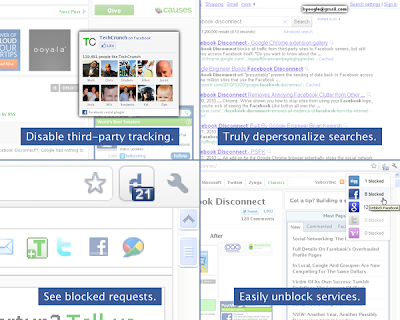Disconnect was covered by the Wall Street Journal (blog) today (note to future Disconnect scribes: this underline thing is called a hyperlink). The post features the work of one of Google’s master bunko artists, whom I’d like to debunk for you:
Google spokesman Chris Gaither declined to comment on Disconnect, but said that users can also turn off search personalization by removing their Web history. (Instructions are here.)
The change Google suggests is strictly cosmetic — their search results will be displayed differently (i.e., not personalized), but your queries and cookies will still be logged by them and kept for 18 months.


 Sometime today,
Sometime today, 





